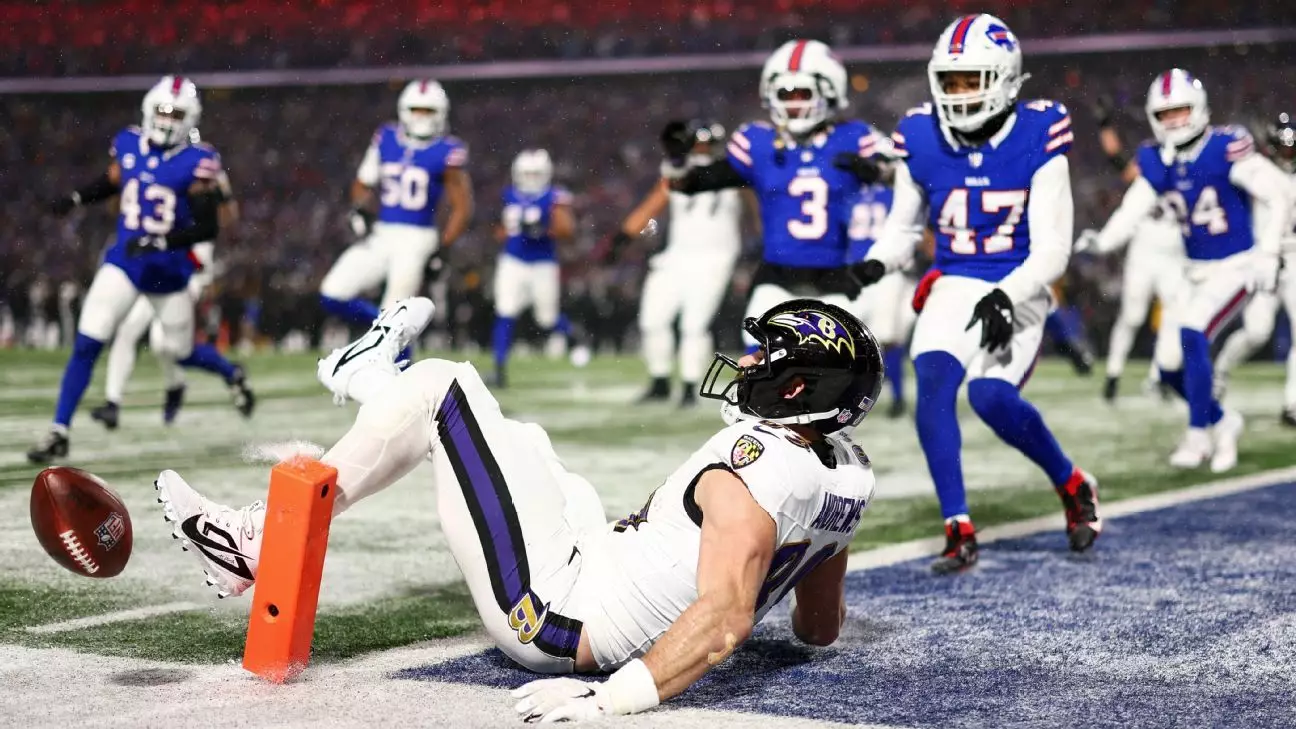The Baltimore Ravens’ recent playoff loss to the Buffalo Bills in the AFC divisional round has ignited a firestorm of emotions—primarily frustration—among players and fans alike. With the final score settling at 27-25, the defeat once more highlighted a familiar narrative of near success thwarted by undisciplined play. Lamar Jackson, the reigning NFL MVP, expressed his indignation following the game but encapsulated a truth that goes beyond simply naming individuals at fault. The Ravens’ loss stemmed not just from a pivotal moment—a dropped 2-point conversion—but from a problematic pattern of turnovers that significantly undermined their performance.
Turnovers: The Achilles’ Heel
Lamar Jackson’s candid acknowledgment of the role turnovers played in their defeat resonates with a deeper issue that has plagued the Ravens historically. Fumbling the ball and throwing interceptions when they mattered most has been a recurring challenge for Jackson. On this fateful day, Jackson himself contributed to the turnover tally, marking a discouraging reality considering he had maintained a commendable season with a career-low in interceptions. His frustrations boiled over as he lamented, “We can’t have that,” a statement that encapsulates the urgency for change. The Ravens had been moving the ball proficiently only for mistakes to mask their potential.
The strategic play-calling and execution under pressure are vital components that seem to elude them time and again in playoff scenarios. Jackson’s early-game errors—a fumble and an interception—served to compound the mounting pressure rather than stabilize it. As a leader, he recognized the need for personal accountability, stating, “I have to protect the ball, so I’m hot.” This sentiment underpins the crux of the Ravens’ struggles: There must be growth in how they handle critical game moments.
While it may be easy to cast blame on Mark Andrews for the dropped 2-point conversion attempt, such criticism trivializes his contributions to the team. In his absence from post-game discussions, a larger conversation arises about the pressure placed on players during high-stakes moments. Andrews had been a beacon of reliability throughout the season and unmatched in Ravens history as a touchdown receiver. To witness him misfire in such a crucial situation is deeply frustrating, but it should not overshadow his overall worth to the franchise.
Kyle Hamilton’s defense of Andrews speaks volumes about the team culture. “People don’t turn on one another,” he stated, validating the collective responsibility that is inherent in any team sport. Andrews’ errors highlight the human element of competition, where even the most reliable contributors can falter under intense scrutiny. Yet, growth arises from such moments; how the team rallies around Andrews and each other could define their collective character moving forward.
A significant theme emerges from the Ravens’ latest playoff exit: the continuous cycle of challenges and opportunities for growth. The team has faced elimination in the postseason repeatedly during Jackson’s tenure. Yet, every loss serves up a learning opportunity. “We need to figure it out,” Jackson voiced emphatically after the game, a declaration that should serve as a starting point for next season’s training and strategic development.
The emphasis on accountability—not just in the players’ performance but in the overall execution of plays—illustrates the need for a renewed focus as they prepare for the next season. The Ravens must delve into their performance metrics, strategize extensively during the offseason, and prioritize ball security and situational awareness to rise above these repeated pitfalls.
For Jackson, the road ahead is filled with both motivation and urgency; he expressed weariness in being “right there” without attaining that tantalizing Super Bowl victory. As the only multiple-MVP award winner without a championship ring, Jackson’s pursuit embodies the aspirations of not just himself, but of an entire franchise and its fanbase. For the Ravens to transform potential into realization, they must learn to harness their collective strength and shore up weaknesses, emerging with lessons learned from the trials of past playoff failures.
It’s through such adversity—painful and infuriating as it may be—that true resilience is built. The Ravens are not just a team clinging to hope; they are a unit poised to cultivate growth, turn their frustrations into fuel, and strive toward the goal of elevating their legacy in the coming seasons. With resolve and a concerted effort toward improvement, they can change their narrative from one of heartbreak to one of triumph.


Leave a Reply